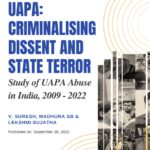When reading books is criminalised: Examining UAPA, sedition cases in India
The News Minute / by Prajwal Bhat, edited by Vidya Sigamany
Among other things, books read by students and activists are increasingly part of chargesheets in sedition and terror cases.
In Franz Kafka’s novel The Trial, the protagonist is prosecuted by an unknown authority that drags him through opaque legal proceedings where the nature of his crime is not revealed, to him or the reader. Such legal bureaucracies that are seemingly far-fetched are not too dissimilar to the trials of students, activists, and academics in India who are charged with sedition or under the Unlawful Activities (Prevention) Act (UAPA).
Perhaps the account that is most reminiscent of Kafka’s novel is Sagar Abraham-Gonsalves describing the police ransacking their home and confiscating books, computers, and hard drives before arresting Sagar’s father, activist Vernon Gonsalves, in connection with the Bhima Koregaon case.
Read more
Also read:

● Report: UAPA – CRIMINALISING DISSENT AND STATE TERROR (PUCL / Sep 2022)
Download report
● Will SC’s Sedition Order Mean Relief for Delhi Riots, Bhima Koregaon Accused? (The Quint / May 2022)
● Explainer: How the Sedition Law Has Been Used in the Modi Era (The Wire / Mai 2022)


